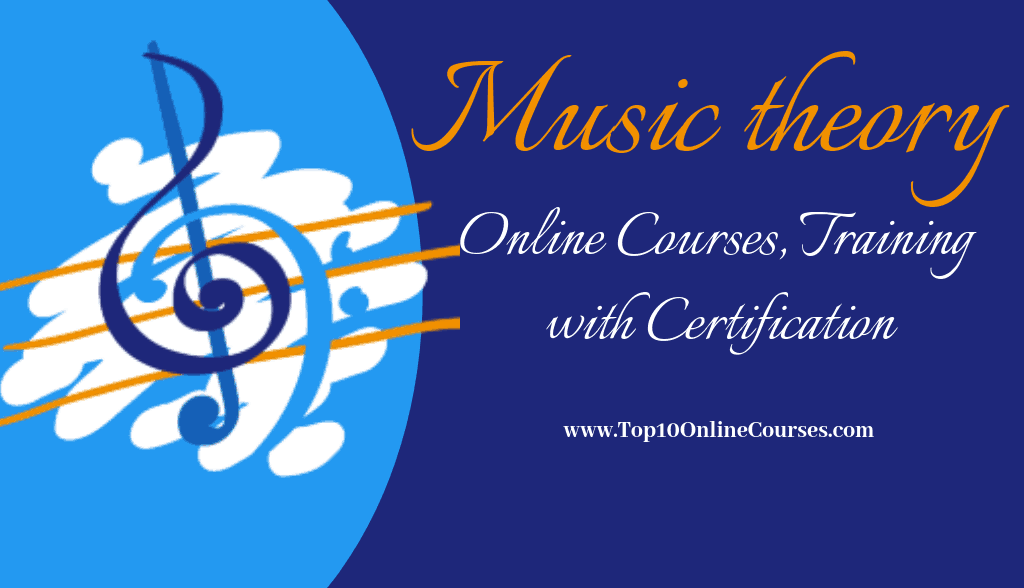Here Best Music Theory Online Courses
Table of Contents
#1 Music Theory Comprehensive Complete! (Levels 1, 2, & 3)
#2 Music Theory Comprehensive Combined: Part 4, 5, & 6
Mastering Music Theory and SATB Composition with College-Level Music Theory
In this class, we will cover:
- My approach to Music Theory
- Tools you will need to learn Music Theory quickly and efficiently
- How Modes Work
- The History of Modes
- Identifying the Musical Modes
- Incorporating modes into popular music
- Analysis of popular and classical music, including the Simpsons TV Theme Song, and the Beetles.
- Interval Exploration
- Compound Intervals
- Rules for Inversion
- Augmented Intervals
- Diminished Intervals
- Enharmonic Equivalence
- Labeling Dissonance
- Counterpoint in Species
- The Rules of Counterpoint
- Compositing with Counterpoint
- Types of Contrapuntal Motion
- Creating music with Counterpoint
- Tools of Counterpoint
- Second Species Counterpoint
- Metric Accents and Diminutions
- Resolutions
- Passing Tones
- Consonant Skips and Leaps
- Neighbor Tones
- Writing Compelling Melodies
- Third Species Counterpoint
- The Cambiata
- Double Neighbor Tones
- Fourth Species Counterpoint
- Rhythmic Displacement
- Suspensions
- 4-3, 7-6, and 9-8 Suspension Types
- Consonant Suspensions
- Chains of Suspensions
- Fifth Species Counterpoint
- Free Counterpoint
#3 Music Theory Comprehensive Combined: Part 7, 8, & 9
#4 Music Theory for Electronic Producers – The Complete Course!
Join Successful students in Music Theory for Electronic Producers for Creating, Arranging and Analysing Music Theory
Learning how to write and create music effectively will dramatically improve the quality of your music and the speed you create it.
In this course, you will gain a deep understanding of Music Theory and ideas techniques and formulas to use when creating your own electronic music to allow you more options. You’ll learn the beauty and the power of music theory that’s used by professionals today.
This course will cover such topics as major scales, minor scales, major chords, minor chords, diminished chords, chord progressions, modulation, relative majors, relative minors, modes, song analyse, deconstructed several tracks, writing a song from a drum beat, how to write a song from a chord progression, how to write a song from a melody, how to write melodies, how to write harmonies, how to work out keys and scales, pentatonic scales, and more.
What you’ll learn in this course will make you a better music producer, and improve your songwriting abilities in any Digital Audio Workstations!
Learn to love music theory and creating electronic music with these easy to learn techniques!
you will learn
- The Keyboard layout and major and minor scales
- Chords and Inversions
- Major and Minor chord progressions
- Writing Melodies and bass parts
- How to Analyse the music theory in electronic tracks
- Modes and other scales
#5 Music Theory for Electronic Music COMPLETE: Parts 1, 2, & 3
Producing Music Using the Harmonic Techniques of the Professionals!
This course is a combination of all three of my Music Theory for Electronic Musicians classes: Music Theory for Electronic Musicians, and Music Theory for Electronic Musicians 2, and Music Theory for Electronic Musicians 3. In this class we learn how to work with the piano roll editor in a DAW to make harmonies, melodies, and whole tracks, and then we expand on those ideas and work with harmonic patterns (harmony) that is more rich than just major and minor.
Production Techniques Through Theory The most important part of this class is an extensive foray into using these techniques in actual tracks. I’ll be creating 9 tracks through this class, right along with you, each using a different technique so you can see exactly how I incorporate it right into my music.
Full Sessions After each production project, I’ll give you the whole session of what I made using the techniques for you to play with. You can download it, expand on it, re-work it, and even release it as your work.
If Your Music is Missing Something, This is Probably It. If you are finding that you are writing track after track, and while they sound good, there is something they are missing – then this it. You are missing the sense of harmony that professional producers have. In this class, I’ll arm you with all the tools you need to produce those tracks just like you imagine them.
Structure This course consists of video lectures, which all contain a session in Ableton Live 9. If you are using a different program (or none at all), no worries! This isn’t a class on how to use Ableton Live, and the concepts can be applied to any DAW.
you will learn
- By the end of this course, you will have improved your tracks by understanding how to build chords and melodies that work together.
- Understand and apply minor chords
- Use the circle of fifths to generate new ideas for your own tracks
- Work within minor keys to write compelling melodies and basslines
Best Music Theory Books:
#1 Alfred’s Essentials of Music Theory: A Complete Self-Study Course for All Musicians (Book & 2 CDs) by Andrew Surmani
#2 Music Theory for Guitarists: Everything You Ever Wanted to Know But Were Afraid to Ask (Guitar Method) by Tom Kolb
#3 Music Theory For Dummies by Michael Pilhofer
#4 Music Theory for Computer Musicians by Michael Hewitt
#5 Berklee Music Theory Book 1 by Paul Schmeling
#6 Music Theory: From Beginner to Expert – The Ultimate Step-By-Step Guide to Understanding and Learning Music Theory Effortlessly (With Audio Examples) (Volume 1)
